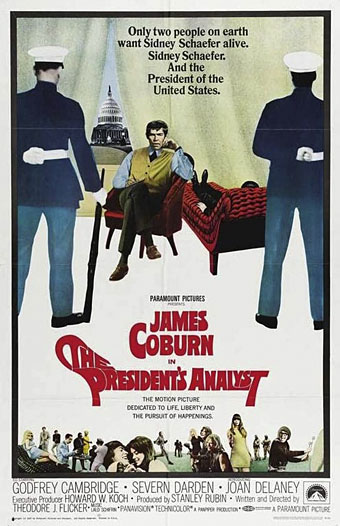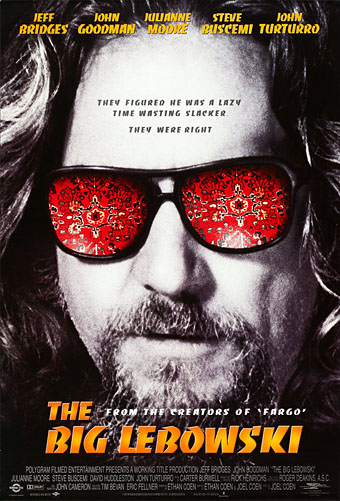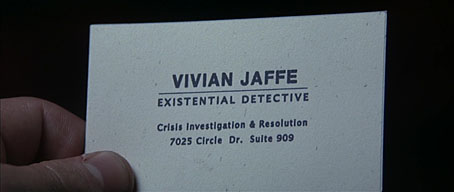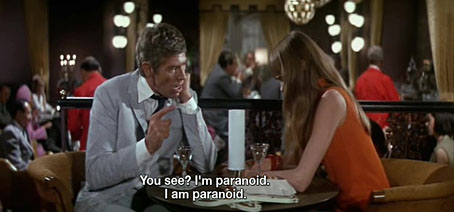
(Pynchonian? Pynchonesque? Pynchon-heads can no doubt supply the most common descriptor but for now Pynchonian will do.)
Is it possible to identify a Pynchonian strand in cinema? This question came to mind while I was reading the end of Gravity’s Rainbow, and probably a little before then during a scene that takes place in the Neubabelsberg studio in Berlin. The Pynchon reading binge is still ongoing here—after finishing the Rocket book I went straight on to Vineland, and I’m currently immersed in Mason and Dixon—so I’ve been watching films that complement some of the preoccupations in the Pynchon oeuvre, at least up to and including Vineland. This is a small and no doubt contentious list but I’m open to further suggestions. Inherent Vice is excluded, I’ve been thinking more of films that are reminiscent of Pynchon without being derived from his work. Elements that increase the Pynchon factor would include: a serio-comic quality (essential, this, otherwise you’d have to include a huge number of thrillers); detective work; paranoia; songs; and a conspiracy of some sort, or the suspicion of the same: a mysterious cabal–the “They” of Gravity’s Rainbow—who may or may not be manipulating the course of events.
The President’s Analyst (1967)
I’d be very surprised if Pynchon didn’t like this one. James Coburn as the titular analyst, Dr Sidney Schaefer, has little time to enjoy his new job in Washington DC before half the security services in the world are trying to kidnap him to discover what he’s learned about the President’s neuroses. This in turn leads the FBI FBR to attempt to kill Schaefer in order to protect national security. Pynchonian moments include a bout of total paranoia in a restaurant, Canadian spies disguised as a British pop group (“The ‘Pudlians”), and a visit to the home of a “typical American family” where the father has a house full of guns, the mother is a karate expert, and the son uses his “Junior Spy Kit” to monitor phone conversations. Later on, an entire nightclub gets spiked with LSD. This is also the only film in which someone evades abduction to a foreign country by the cunning use of psychoanalysis.
Is it serio-comic? Yes.
Is there detection? In the background: the CIA CEA and KGB agents have to work together in order to outwit the FBI FBR and discover who the ultimate villains might be.
Is there paranoia? You only get more paranoia in one of the serious conspiracy dramas of the 1970s like The Conversation or The Parallax View. (The latter includes the same actor who plays the All American Dad, William Daniels.)
Any songs? Yes. Coburn hides out for a while with the real-life psychedelic group Clear Light, and helps with their performance in the acid-spiked nightclub.
“They”? There are multiple “They”s in this one.
Pynchon factor: 5. Maybe a 6 for the LSD.

Nashville (1975)
This one is a stretch but Robert Altman is the director I think of as closest to Pynchon’s sensibility even if individual works are light on the Pynchon factor. His films are often rambling, quirky and satirical—especially when he goes the ensemble route—but never too comic to avoid a sudden lurch into the dark. The Long Goodbye might seem a more likely choice, given the way it points to subsequent Chandler variations like The Big Lebowski (see below) and Inherent Vice, but it’s still Chandler’s story. Nashville is pure Altman, the best of his ensemble entries and my choice for his best film of all, a portrait of America in the mid-1970s where someone can be loved by millions yet still be a target for assassination. It’s worth noting that the director of Inherent Vice, Paul Thomas Anderson, was the insurance standby when Altman was directing his final film, The Prairie Home Companion.
Is it serio-comic? Yes.
Is there detection? No.
Is there paranoia? No, although as a portrait of the USA in the 1970s it can’t avoid a lurking sense of unease.
Any songs? Lots of songs.
“They”? No.
Pynchon factor: 2

Simon (1980)
The debut feature from Marshall Brickman, Simon is an overlooked oddity with a great performance by Alan Arkin as a college professor, Simon Mendelssohn, who gets tricked by the Institute for Advanced Concepts into believing he’s an extraterrestrial. Parts of this play like a comic version of Altered States, which coincidentally was released the same year. Both films feature reckless quests for academic glory, flotation tank experiments (Simon includes a reference to Dr John Lilly), and regressions to earlier stages of evolution. Pynchonian moments include a church commune who worship the television, a gas that reduces intelligence, and a self-aware computer called “Mother” whose human interface is a giant phone receiver.
Is it serio-comic? Yes.
Is there detection? No.
Is there paranoia? A little.
Any songs? No.
“They”? The IAC are a small but powerful “They”, with carte blanche to foist their whims on an unsuspecting nation.
Pynchon factor: 2.5

The Big Lebowski (1998)
When the book trailer for Inherent Vice appeared in 2009 (with narration by the author himself…or was it? etc), a common reaction was “This sounds just like The Big Lebowski“. If The President’s Analyst is the closest Hollywood gets to The Crying of Lot 49 then The Big Lebowski may be the closest to Vineland‘s story of the youth of the hippy era coping with life in a world that’s passed them by.
Is it serio-comic? Yes.
Is there detection? Yes.
Is there paranoia? A little. Most of the time The Dude is more concerned with trying to keep up with his continual changes of fortune.
Any songs? Lots of songs on the soundtrack, plus the Busby Berkeley-style dream sequence.
“They”? Yes.
Pynchon factor: 4.5

I Heart Huckabees (2004)
David O’Russell’s mélange of existential philosophy, environmentalism and coincidence is like Wes Anderson with a more political edge, and the kind of quirky comedy there was still space for in the Hollywood of the late 1990s/early 2000s. Jason Schwartzman is Albert Markovski, a poetry-writing environmental activist with a coincidence problem who turns to existential detectives, Vivian Jaffe (Lily Tomlin) and husband Bernard Jaffe (Dustin Hoffman), for a solution. “Everything is connected”, Bernard insists, so it’s no surprise that the presence of Lily Tomlin returns us to Nashville, while the pair require a little of Sidney Schaefer’s psychoanalysis to get to the bottom of Albert’s problems. Meanwhile, the Jaffes’ former pupil, Caterine Vauban (Isabelle Huppert), is lurking in the wings, tempting Albert with the attractions of sex and nihilist philosophy (shades of The Big Lebowski).
Is it serio-comic? Yes.
Is there detection? Yes.
Is there paranoia? A little. Albert is increasingly worried about losing control of his protest group.
Any songs? Shania Twain puts in an appearance but she doesn’t sing.
“They”? The Huckabees Corporation is a small-scale “They”, manipulating the environmentalists for their own ends.
Pynchon factor: 3.5
Honourable mentions: WD Richter’s The Adventures of Buckaroo Banzai Across the 8th Dimension (1984) makes it to the Pynchon Zone via its appropriation of “Yoyodyne”, the name of the defence contractor from V. and The Crying of Lot 49. Despite this, and much as I like Buckaroo Banzai, I don’t think it’s Pynchonian enough for this list, although the writers at the defunct Pynchon site, Spermatikos Logos, might disagree. This archived page makes a case for the film, and also mentions a possible reciprocation from the author which I missed when I was reading Vineland.
Likewise, Richard Linklater’s debut, Slacker (1990), also came to mind. It has the requisite large cast of idlers and eccentrics (including a couple of conspiracy obsessives), plus a meandering yet connected structure, but it doesn’t otherwise seem Pynchonian enough.
Anything else I’ve missed?

Update: Lodge 49 (2018–2019)
Several people recommended this TV series (thanks!) so here it is. And while Jim Gavin’s creation may not be a feature film it’s very definitely Pynchonian. See this post for details.
Is it serio-comic? Yes.
Is there detection? Yes.
Is there paranoia? A little. Dud and Ernie have a paranoid episode involving a drone.
Any songs? Yes, from the characters themselves and also from Broadcast and others on the soundtrack.
“They”? Once again, there are multiple “Theys”.
Pynchon factor: 49
Update 2: Further recommendations at Letterboxd.
Previously on { feuilleton }
• Going beyond the zero
• Pynchon and Varo
• Thomas Pynchon – A Journey into the Mind of [P.]


Repo Man.
Good suggestion! It did cross my mind when I was writing the note about Slacker: the line “You know how everybody’s into weirdness right now?” is one I continually think is from Slacker when it’s from Repo Man. I’ve not watched the latter for ages so it’s obviously time for a return visit.
Reviewing your criteria used to evaluate what may or may not be rated , I can’t help but think that the recent American series ‘Lodge 49’ might fill the bill. Did it play in the UK?
I wonder if MULHOLLAND DRIVE and INLAND EMPIRE would also fit the criteria for ”Pynchonesque” cinema? David Robert Mitchell’s UNDER THE SILVER LAKE might also qualify. Doubtless others will come to me.
Richard: Someone on Twitter made exactly the same suggestion. I’ve not seen the series but I evidently ought to.
Liam: Lynch’s world is very much his own, even when he’s skirting the margins of Billy Wilder’s Sunset Boulevard as he does in Mulholland Drive. The Feds in Vineland aren’t the good guys the way they are in Twin Peaks.
president’s analyst–long one of my all-time favorite movies.
glad to see some new attention brought to it!
to me, alan rudolph’s “trouble in mind” seems pynchonesque–not so much specifics (though non-asian people using korean slang in the mid-80s is a bizarre touch) as the general atmosphere…
Thanks, Michael. I like Trouble in Mind very much–I rewatched it a couple of years ago–but for me it’s a borderline case. A bit too serious, despite Keith Carradine’s burgeoning hairstyle, and not enough songs. It’s still a great film, though. I like the way it’s like an offbeat science fiction or fantasy scenario that doesn’t feel the need to explain itself, a rare thing in Hollywood. And Alan Rudolph is another director with ties to Robert Altman, he even worked on Nashville…
Lodge 49 is (or at least was) available via Amazon Prime.
I’m surprised it’s not come across your radar previously, as the soundtrack is sublime – including new work by The Soundcarriers. Episode 1 of the second season is titled ‘All Circles Vanish’ after the Broadcast track, who are a major love of the writer.
It’s pleasingly lightweight – as if My Name is Earl had been made by Discordians rather than Scientologists.
It goes without saying, the 49 is deliberate.
I’ve pretty much given up on TV after being burned by too many mediocre dramas. For the past few years I was relying on Twitter for recommendations but I stopped going there over a year ago. (I still have a Twitter account but use it now solely to pass on blog updates and forward news about things I’m working on.) So unless I see a worthwhile recommendation somewhere then I ignore everything televisual in favour of the entire history of world cinema. That sounds pompous but there’s still a huge amount of films past and present that I’ve never seen. I’d rather spend time with them than with a TV series of dubious quality. As with cinema, if there’s a decent TV drama out there then you’ll hear about it eventually, as these comments demonstrate. I don’t mind waiting.
I’ve only read Lot and Gravity, and those a long time ago – so what do I know, but somehow Dennis Potter’s Singing Detective (BBC TV) and Terry Gilliam’s Brazil came to mind …
Mike Leigh’s Naked was the first movie I thought of. That movie is maybe a touch more nihilistic than Pynchon but does feel Pynchonian. David Thewlis ranting about how credit card barcodes represent Revelation’s 666 is a great conspiracy theory. Terry Gilliam’s stuff also came to mind.
John M. Simmons Jr.: I’d put Potter in the same class as David Lynch, his world is very much about his own obsessions even when it references things outside it. Gilliam can certainly do the wacky side of things (and the drug side in Fear and Loathing…) but Brazil is dystopian and nightmarish in a manner that’s a long way from Pynchon.
Luke M.: Yeah, I think you need more than just conspiracies otherwise, as with thrillers, you’d have to include a large number of generic features. Pynchon’s oeuvre gives you a peculiar blend of things that you don’t find so often in cinema which is why the question intrigued me, and why the list above is so short. The individual elements are everywhere but you’ll seldom find them all in one place; most thrillers are paranoid to some degree but most thrillers don’t also have people breaking into song all the time. The American film world prefers things to be much more straightforward than written fiction.
I love this topic! I don’t have any real suggestions, though this has gotten my mind racing.
I did think of Lynch, but I agree with your reasoning. I also thought of Gilliam – I can imagine a Pynchonian film made up of elements from Gilliam: the humor and satire of Time Bandits and Munchausen; the paranoia and conspiracy of Brazil and Twelve Monkeys; the drug-crazed atmosphere of Fear and Loathing. I wonder what Gilliam’s Watchmen would’ve looked like.
I’m glad you mentioned Linklater. He could make a great Pynchonian film if he put his mind to it. The Whole Sick Crew seems perfect for him.
Winter Kills
Someone on Twitter mentioned Winter Kills. It’s a great film but I think it needs more wackiness (and songs) to be properly Pynchonesque. Conspiracy and a paranoid quality don’t make it alone otherwise a huge number of thrillers would be on this list.
Re-upping UNDER THE SILVER LAKE which maybe got lost due to the adjacent mention of Lynch. Contemporary update with lots of detection and They and LA. Trying to get more people to watch this.
Thanks, Jason, that’s one I’ve yet to see so I’ll check it out.